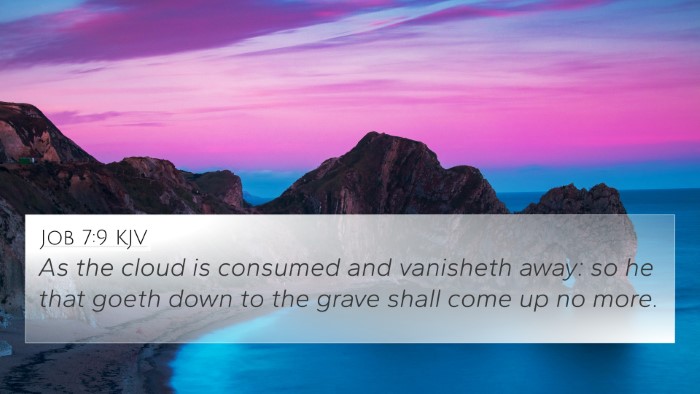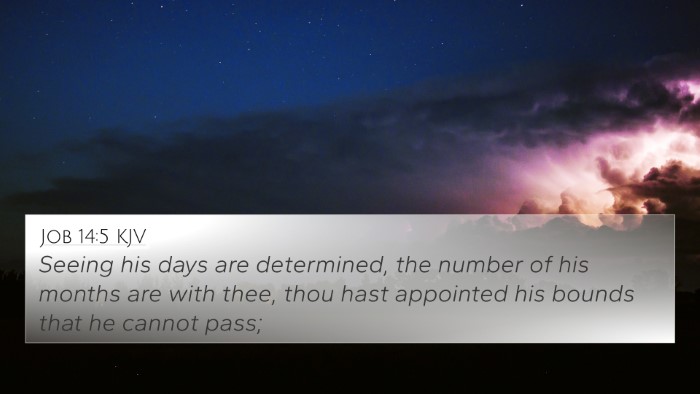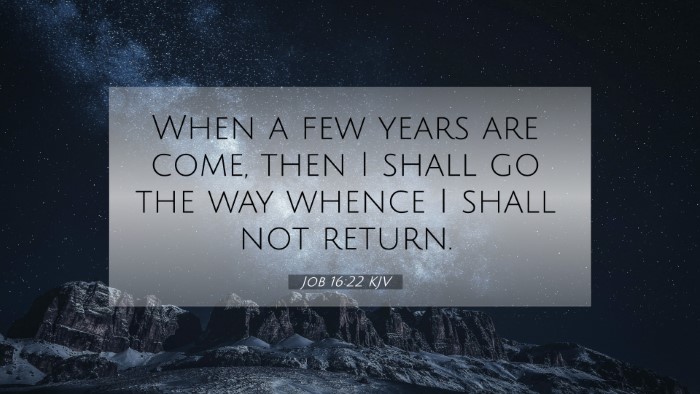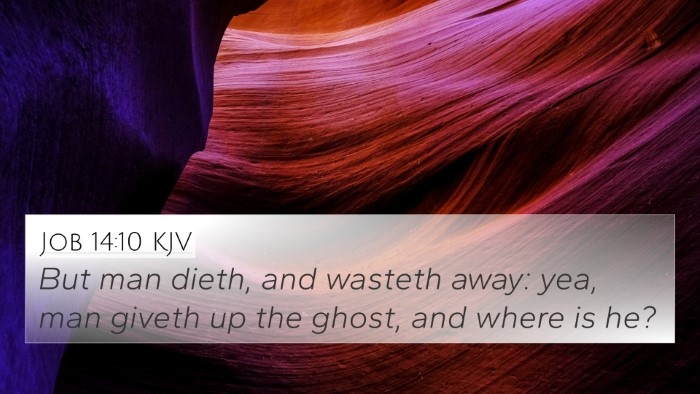Old Testament
Genesis Exodus Leviticus Numbers Deuteronomy Joshua Judges Ruth 1 Samuel 2 Samuel 1 Kings 2 Kings 1 Chronicles 2 Chronicles Ezra Nehemiah Esther Job Psalms Proverbs Ecclesiastes Song of Solomon Isaiah Jeremiah Lamentations Ezekiel Daniel Hosea Joel Amos Obadiah Jonah Micah Nahum Habakkuk Zephaniah Haggai Zechariah MalachiJob 16:22 Similar Verses
Job 16:22 Cross References
When a few years are come, then I shall go the way whence I shall not return.
Uncover the Rich Themes and Topics of This Bible Verse
Listed below are the Bible themes associated with Job 16:22. We invite you to explore each theme to gain deeper insights into the Scriptures.
Job 16:22 Cross Reference Verses
This section features a detailed cross-reference designed to enrich your understanding of the Scriptures. Below, you will find carefully selected verses that echo the themes and teachings related to Job 16:22 KJV. Click on any image to explore detailed analyses of related Bible verses and uncover deeper theological insights.

Job 14:14 (KJV) »
If a man die, shall he live again? all the days of my appointed time will I wait, till my change come.

Job 7:9 (KJV) »
As the cloud is consumed and vanisheth away: so he that goeth down to the grave shall come up no more.

Job 14:5 (KJV) »
Seeing his days are determined, the number of his months are with thee, thou hast appointed his bounds that he cannot pass;

Ecclesiastes 12:5 (KJV) »
Also when they shall be afraid of that which is high, and fears shall be in the way, and the almond tree shall flourish, and the grasshopper shall be a burden, and desire shall fail: because man goeth to his long home, and the mourners go about the streets:
Job 16:22 Verse Analysis and Similar Verses
Understanding Job 16:22
Job 16:22 reads: "When a few years are come, then I shall go the way whence I shall not return."
This verse is a poignant reflection of Job's state of mind as he grapples with his suffering and despair. According to public domain commentaries, there are several key insights to consider regarding this scripture.
Summary of Key Themes
The predominant themes in Job 16:22 center around mortality, hope, and divine justice. Here, Job acknowledges his mortality and the inevitability of death, which creates a stark contrast with his longing for vindication and understanding from God.
Commentary Insights
-
Matthew Henry's Commentary:
Henry emphasizes Job's despair and helplessness, noting that he feels his life is fleeting and recognizes the finality of death. Job's words convey a sense of resignation to fate, highlighting the brevity of human existence and the urgency of seeking divine reconciliation.
-
Albert Barnes' Notes:
Barnes points out that Job is reaching a moment of contemplation about the afterlife. He understands that his suffering will soon lead him to death, and he expresses a desire for justice, asserting that his spirit will ultimately find rest in God.
-
Adam Clarke's Commentary:
Clarke delves into the philosophical aspect of the verse, discussing the 'way whence I shall not return' as an acknowledgement of the unreturnable nature of death. He points to Job's deep yearning for answers from God, coupled with an understanding of the eternal nature of God compared to human frailty.
Cross-references and Related Verses
Job 16:22 connects with various other Biblical verses that provide deeper insights into similar themes. Here are some notable cross-references:
- Hebrews 9:27: "It is appointed unto men once to die, but after this the judgment." - This verse underscores the inevitability of death and the eventual divine judgment that follows.
- Ecclesiastes 3:1-2: "To everything there is a season, and a time to every purpose under the heaven: a time to be born, and a time to die." - This passage speaks to the natural cycle of life and death, mirroring Job's contemplation of mortality.
- Job 14:5: "Seeing his days are determined, the number of his months are with thee, thou hast appointed his bounds that he cannot pass." - This verse reiterates the theme of appointed time and limitations of human life.
- Psalm 39:4-5: "LORD, make me to know mine end, and the measure of my days, what it is; that I may know how frail I am." - A reflective expression of the brevity of life similar to Job's sentiments.
- Job 7:1: "Is there not an appointed time to man upon earth? Are not his days also like the days of a hireling?" - Job expresses the transient nature of human life in this verse as well.
- Isaiah 38:18: "For the grave cannot praise thee, death can not celebrate thee: they that go down into the pit cannot hope for thy truth." - This verse conveys the absence of praise and hope once dead, paralleling Job's desperation for life and justice.
- Philippians 1:21: "For to me to live is Christ, and to die is gain." - Paul reflects on life and death positively, contrasting with Job's lamentation but also resonating with the idea of hope beyond death.
- Revelation 14:13: "Blessed are the dead which die in the Lord from henceforth: Yea, saith the Spirit, that they may rest from their labours; and their works do follow them." - This passage offers hope for eternal rest, aligning with Job's quest for relief.
- Romans 6:23: "For the wages of sin is death; but the gift of God is eternal life through Jesus Christ our Lord." - This contrasts the fate of death with the gift of eternal life, providing a completeness that Job is searching for.
Theological Implications
From a theological perspective, Job 16:22 serves as a reminder of the transient nature of human life, pointing towards the greater metaphysical questions of existence, suffering, and divine justice. It highlights how an understanding of mortality can lead believers to a closer relationship with God, realizing that ultimate answers and rest can only come from divine revelation.
Conclusion
In summary, Job 16:22 encapsulates profound truths about life, death, and the longing for divine justice. Through reflections found in various commentaries and by examining related scriptures, one can appreciate the complexities of Job’s emotions and the broader Biblical narrative concerning the human condition. This exploration encourages believers to seek connections between Bible verses, enriching their understanding through comparative Bible verse analysis and thematic studies.



